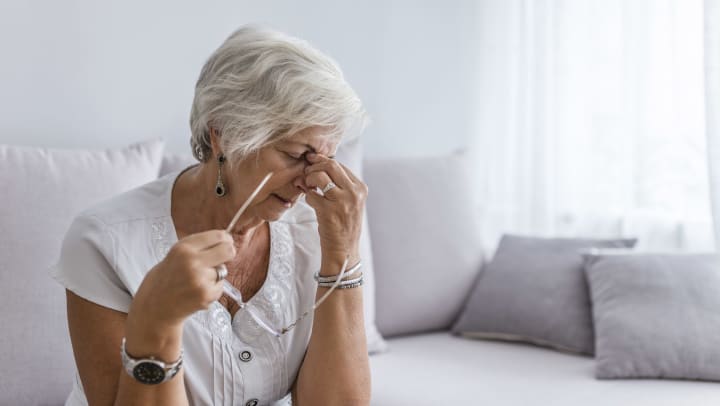PART ONE: Explaining the Risks, Causes, and Effects of Stress for Seniors
Many of us envision retirement as a free, peaceful time to simply unwind and enjoy the people, places, and activities we enjoy most – worry-free – and that’s exactly what it should be! But all too often, a senior’s golden years become an anxiety-inducing chapter of life, and the stress experienced can even speed up the aging process.
In this multi-part Cardinal Bay Stress Management Series, we’ll explore:
-
What stress is and why it happens
-
Why seniors are more vulnerable to stress
-
The causes and effects of stress
-
The signs and symptoms of stress
-
Basic strategies for relieving stress
-
Specific stress-reducing activities seniors can do
-
Steps caregivers and loved ones can take to reduce stress in seniors
By the end, you should have an expert-level, in-depth handle on the important subject of stress in older adults and how you can conquer it. Today, let’s begin by explaining stress and by talking about the different risks, causes, and harmful effects of stress on seniors.
The Meaning of “Stress” and the Reason Why Humans Experience It
The World Health Organization (WHO) says, “Stress can be defined as a state of worry or mental tension caused by a difficult situation. Stress is a natural human response that prompts us to address challenges and threats in our lives.”
Stress occurs because of how humans have evolved – as a survival mechanism and the source of what scientists call the “fight-or-flight” response. In other words, stress is completely natural. As WHO further notes, “Everyone experiences stress to some degree. The way we respond to stress, however, makes a big difference to our overall well-being.”
Seniors Are at Greater Risk of Stress and Its Negative Effects
Because of the common circumstances they go through, as well as their particular vulnerability to various health and wellness concerns, older adults face bigger threats when it comes to stress.
Jennifer Tripken , a healthy aging expert and an Associate Director at the National Council on Aging, weighs in. “Stress is a fact of life that most of us experience at one time or another. But the unique relationship between stress and aging means that older adults and their families, friends, and caregivers should pay particular attention to what causes it, how to recognize it, and what to do about it.”
“alarm” that releases potentially harmful hormones, like cortisol and adrenaline. And as we age, our brains could become less adept at regulating the levels of those hormones that can have detrimental, long-term repercussions.
One HealthDay article states, “According to a report from the University of California at San Francisco, extra cortisol over the years can damage the hippocampus, a part of the brain that's crucial for storing and retrieving memories. Several studies have found that high cortisol goes hand in hand with poor memory, so we might be able to chalk up certain ‘senior moments’ to stress.”
Unfortunately, that all means it’s extra difficult for seniors struggling with anxiousness or worry to minimize the impacts – both physical and mental – on their own.
Here's What Causes Stress in Seniors
Stress doesn’t discriminate, and it affects people of every age and background. However, along with aging comes new concerns, with plenty of factors surfacing that can influence stress levels in seniors. They include:
-
Life transitions
-
The onset of serious medical conditions
-
Managing health and/or multiple illnesses
-
Physical limitations
-
Chronic pain
-
Cognitive changes
-
Worries over finances and how to fund retirement
-
A move or other difficult changes to their daily routine
-
Strained relationships
-
Grief, loss of loved ones
-
A general sense of loss – of independence, mobility, youth, etc.
These are just some of the circumstances that could be major contributors to stress – and they can all lead to troubling problems.
The Many Effects of Stress on Older Adults
Now that we better understand the usual causes of stress, let’s take a look at the harmful effects of stress on seniors, and why they’re more susceptible to them.
First, the American Institute of Stress finds a close link between stress and inflammation. Stress prevents our bodies from countering the particular types of inflammation that cause age-related conditions. Increased stress means increased inflammation. And when we suffer increased inflammation while stressed, health complications result. Additionally, stress suppresses the immune response, making seniors, especially, even more vulnerable to infections and other serious diseases.
Chronic stress can lead to or worsen a large number of physical and mental issues, such as:
-
High blood pressure
-
Heart disease
-
Atherosclerosis (thickening or hardening of the arteries)
-
Type 2 diabetes
-
Arthritis
-
Alzheimer’s disease, dementia, and other forms of memory loss
-
Slower response times and the corresponding inability to sense trouble and avoid accidents
-
Cancer
-
Decreased bone density
-
Loss of vision and hearing
-
A reduction in the effectiveness of certain vaccines, including those for the flu and pneumonia
Last but not least, stress can cause the aging process itself to accelerate – and nobody wants to get older before their time!
So much more information on this subject is on its way. Be sure to follow our blog to catch the next installments of our Stress Management Series. You’ll discover how to recognize stress in seniors and an array of crucial methods to prevent its concerning effects.
Rely on Relaxed, Resort-Style Senior Living
Designed to relieve daily stressors and staffed by skilled, attentive teams, Cardinal Bay’s senior living communities provide worry-free independent living, assisted living, and memory care in Texas and Oklahoma. Our residents enjoy a highly social, relationship-centered environment and a wealth of stimulating activities, ultimately leading to healthier, richer, and more fulfilling lives.
Be sure to tour the communities you like and speak with staff members and residents to guarantee you have all the vital information in hand to make the best decision.

